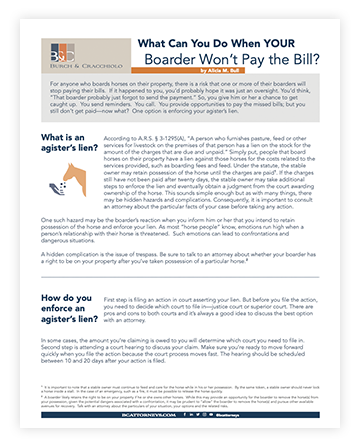For anyone who boards horses on their property, there is a risk that one or more of their boarders will stop paying their bills. If it happened to you, you’d probably hope it was just an oversight. You’d think, “That boarder probably just forgot to send the payment.” So, you give him or her a chance to get caught up. You send reminders. You call. You provide opportunities to pay the missed bills; but you still don’t get paid—now what? One option is enforcing your agister’s lien.
What is an agister's lien?
According to A.R.S. § 3-1295(A), “A person who furnishes pasture, feed or other services for livestock on the premises of that person has a lien on the stock for the amount of the charges that are due and unpaid.” Simply put, people that board horses on their property have a lien against those horses for the costs related to the services provided, such as boarding fees and feed. Under the statute, the stable owner may retain possession of the horse until the charges are paid1. If the charges still have not been paid after twenty days, the stable owner may take additional steps to enforce the lien and eventually obtain a judgment from the court awarding ownership of the horse. This sounds simple enough but as with many things, there may be hidden hazards and complications. Consequently, it is important to consult an attorney about the particular facts of your case before taking any action.
One such hazard may be the boarder’s reaction when you inform him or her that you intend to retain possession of the horse and enforce your lien. As most “horse people” know, emotions run high when a person’s relationship with their horse is threatened. Such emotions can lead to confrontations and dangerous situations.
A hidden complication is the issue of trespass. Be sure to talk to an attorney about whether your boarder has a right to be on your property after you’ve taken possession of a particular horse.2
How do you enforce an agister’s lien?
First step is filing an action in court asserting your lien. But before you file the action, you need to decide which court to file in—justice court or superior court. There are pros and cons to both courts and it’s always a good idea to discuss the best option with an attorney. In some cases, the amount you’re claiming is owed to you will determine which court you need to file in. Second step is attending a court hearing to discuss your claim. Make sure you’re ready to move forward quickly when you file the action because the court process moves fast. The hearing should be scheduled between 10 and 20 days after your action is filed.
What practical things should I consider?
As with most things in life and business the decision to pursue a claim against another entity or person is not always as simple as, “Does he owe me money?” Other considerations include the cost of pursuing your claim, the value of the horse, and other available legal avenues.
When looking at the costs of pursuing your claim, you need to balance the costs of hiring an attorney and court costs, the monetary value of the horse and the amount owed. It may be that the costs of pursuing your claim aren’t worth it when compared to the monetary value of the horse. But, as all animal lovers know, an animal’s value may not be limited to its monetary value. Sometimes an animal’s sentimental value outweighs other considerations. You may have developed a bond with the horse during the time you’ve cared for him and you’d like to keep him. The horse’s full value is a personal assessment that only you can make.
Lastly, you should always consider consulting with an attorney about other legal avenues before filing any claim. Every case is different with unique facts and circumstances and an attorney can help you determine if you have other, perhaps better, options.
While the agister’s lien is not a well-known remedy for unpaid boarders, it may provide hope of recovery when their bills go unpaid.
Alicia “Ali” Bull is an associate attorney with Burch & Cracchiolo. She concentrates her practice in commercial litigation.
1 It is important to note that a stable owner must continue to feed and care for the horse while in his or her possession. By the same token, a stable owner should never lock a horse inside a stall. In the case of an emergency, such as a fire, it must be possible to release the horse quickly.
2 A boarder likely retains the right to be on your property if he or she owns other horses. While this may provide an opportunity for the boarder to remove the horse(s) from your possession, given the potential dangers associated with a confrontation, it may be prudent to “allow” the boarder to remove the horse(s) and pursue other available avenues for recovery. Talk with an attorney about the particulars of your situation, your options and the related risks.

